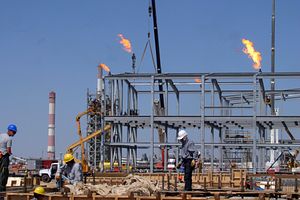A social media post sparked rage among local workers for a subcontractor at one of Kazakhstan’s largest oil fields in the western Atyrau region. The ensuing fight with foreign workers highlighted long-standing socioeconomic grievances.
The onshore Tengiz oil field is the largest oil producer in Kazakhstan. Its operator, Tengizchevroil, is a consortium that includes Chevron (50 percent), ExxonMobil (25 percent), Kazmunaigas (20 percent), and LukArco (5 percent). The consortium hires hundreds of contractors and subcontractors for both its operations and its recent expansion program.
A Libyan worker at one of these contractors, Сonsolidated Contracting Engineering and Procurement (CCEP), posted a picture on social media of him beside a young Kazakh girl, igniting the spirits of local workers at the same company, who contested the foreign workers’ behavior and the different treatment that they were awarded. On June 29, around 1,000 workers declared a strike at the construction compound where they worked. Later reports said that more than 40 people were hospitalized. According to one unconfirmed source, a foreign worker could have died as a result of the beatings.
The Social Costs of Expanding
In 2016, Tengizchevroil agreed to invest $36.8 billion for the expansion of the project, which would increase production by 44 percent by 2022, according to the original plan. Earlier this month, energy minister Kanat Bozumbayev said the field would increase production to 29 million tons in 2019.
Within the framework of the expansion project, the consortium hired several contractors to build additional facilities that would increase production. CCEP is owned by Abu Dhabi-based CCC, a construction company, and operates near the Tengiz production area. CCEP hires a few thousand workers, including hundreds of foreigners, in large part from the Middle East and North Africa.
Traditionally, in Kazakhstan as in other resource-rich countries outside the West, foreign workers receive higher salaries and enjoy better benefits than local workers. The Tengiz oil field is no exception. Heated negotiations and scuffles over labor inequalities occurred in the late 1990s and in the mid-2000s.
In a groundbreaking academic publication, Saulesh Yessenova, associate professor of anthropology at the University of Calgary, wrote that in the aftermath of clashes between workers and management at a contractor, Tengizchevroil refused to allow a government body within the premises of the oil field, opting instead for the creation of a corporate office for industrial relations, where complaints and demands would be considered.
“[The riots of the mid-2000s were] caused by corrupt business practices and systematic labor discrimination and abuse,” Yessenova wrote in 2012.
A long-standing issue, salary inequality, was approached in a piecemeal fashion by Tengizchevroil. The nationalist element, which many have blamed for the June brawl and the 2006 riots, which involved around 3,000 contractors, masked the underlying labor dissatisfaction among local workers.
The Aftermath
Nurlan Nogayev, the governor of the Atyrau region, flew to the site, at the border between the Atyrau and Mangystau regions. He admitted that working conditions were at the core of the labor conflict.
“This problem arose due to different working conditions, a systemic issue that both Tengizchevroil and its contractors must address,” Nogayev told the press.
Local workers claimed that, besides receiving inferior salaries compared to their foreign peers at the site, they were subject to different treatment: They were assigned less comfortable living spaces and were fed with food of “worse quality” at the company’s canteen. Most of the reactions on social media talked of a bubble ready to burst, the selfie being “the last drop” for the local workers.
Work at the Third Generation Plant of Tengizchevroil was temporarily halted.
According to Hisham Kawash, CCC managing director for Kazakhstan and the CIS, the Libyan worker whose selfie sparked the riot was fired on the day of the riots. The company also counts numerous Jordanian and Lebanese workers, who were escorted by the police to a nearby hotel as local workers threw stones to their buses. The governments of Jordan and Lebanon contacted Kazakhstan’s authorities for an official clarification on the events.
At present the Kazakh authorities are investigating the events, treating the riot as a “mass disorder,” which could bring some of the workers under a criminal probe.
On July 1, Tengizchevroil said in a note that the situation was “stable,” and that the company would work with the local government in the investigation through a special commission.
In the absence of independent trade unions, effectively banned by draconian legislation passed in recent years, labor disputes in Kazakhstan have been swept under the rug by both companies and the government. Inevitably, however, dissatisfaction continues to seep through the automated schedule of work at the country’s oil fields. The patchy response that the latest tensions will likely trigger is doomed to miss another occasion to confront the enduring labor conflict.

































